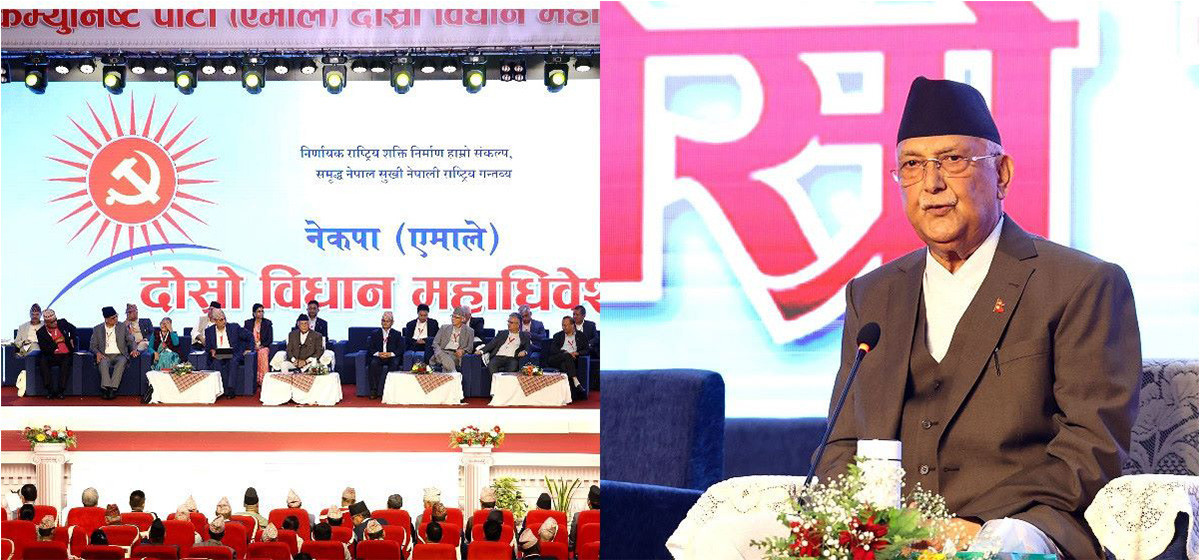At the CPN-UML’s second Statute Convention, most delegates cautioned that internal disputes could undermine the party’s “Mission 2084” campaign. The party has been pushing the mission for two years, but delegates warned that unless internal unity and discipline are strengthened, the campaign risks failure.
Delegates suggested strengthening internal life, resolving disputes on time, settling the membership controversy of former president Bidya Devi Bhandari quickly, and making government actions more effective. They warned that if disputes persist, Mission 2084 could become an empty slogan. One delegate said the party already faces coordinated pressure from the Nepali Congress, Maoist Centre, royalist groups, independents, and UML splinters, and internal rifts would only hurt the party in the 2084 election.
UML statute convention: Group discussions to be held on three r...

Group discussions concluded on Saturday evening, with points compiled into a political document to be presented Sunday for endorsement. While few openly defended Bhandari, many emphasized that failing to resolve her membership issue could harm the party’s direction.
From Sudurpaschim, 49 delegates spoke, and 40 informally backed Bhandari. Some argued she should not be barred from the party. Representatives linked the mission’s success directly to party unity. Similar debates occurred in Bagmati, where delegates like Arun Nepal, Sita Paudel, and Sharmila Karki supported renewing Bhandari’s membership and raised past electoral defeats as cautionary lessons. They said party democracy and internal discipline mattered more than anything else.
From Koshi, few spoke openly, as both party chair KP Sharma Oli and Bhandari hail from there. Still, leaders such as Tara Rai and Yuvaraj Baskota raised questions on internal democracy, arguing that the constitution does not bar Bhandari from politics. In Gandaki, Khagaraj Adhikari strongly opposed her return, warning it could derail Mission 2084. In Karnali and Lumbini, her membership was again linked to the mission’s success.
The convention divided delegates into 10 groups to discuss reports presented earlier by Oli, Vice-chair Bishnu Paudel, and General Secretary Shankar Pokharel. Although formal discussion of Bhandari’s membership was restricted in the main hall, debates repeatedly circled back to it in the context of Mission 2084. On Saturday, reports were also presented by the Election Commission’s coordinator Dr. Vijay Subba, Accounts Commission coordinator Dr. Pushpa Kandel, Discipline Commission coordinator Keshav Badal, and Advisory Council coordinator Amrit Bohora. Over 2,100 delegates are participating, with final reports to be presented by the committee led by Yogesh Bhattarai.
Dispute over dissenting opinion
Standing Committee member Karna Bahadur Thapa was barred from presenting his dissent from the main stage, despite a Secretariat decision allowing it. Delegates said Oli himself blocked him after Thapa raised Bhandari’s membership issue. Thapa was told to share his dissent only within his group, and he later distributed his report there. This created unease in the hall.
Thapa’s report highlighted principles, rules, and conduct. It argued that Bhandari should not be barred from politics, and warned that ignoring party principles and values risks reducing the movement to personal interest. He criticized a culture of fear, greed, and opportunism within the party, which he said erodes judgment and accountability.
He also said sufficient debate has not been held on Janata’s Multiparty Democracy (Jabaja), which should guide party policy, leadership, organization, and conduct. While some progress has been made, Thapa argued it is not enough to meet today’s needs.





































